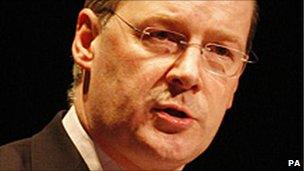Budget review recommends up to 60,000 public jobs cut
- Published
Up to 60,000 public sector workers in Scotland could lose their jobs in the next few years, an independent review commissioned by ministers has said.
The panel, which considered options for future expenditure, recommended a fall in public sector employment of between 5.7% and 10% by 2014-15.
It called for reductions to be made as far as possible by natural wastage.
The panel was created in February to detail which cuts could be made in the face of a £42bn squeeze over 16 years.
The Independent Budget Review report, external set out options that Holyrood may want to consider "in the face of the most challenging public spending environment since the Second World War".
It said one in 10 public sector jobs would have to go if pay grew in line with UK plans, although this could drop to 35,000 (5.7%) if a tougher approach to pay restraint was adopted.
The report called for a two-year pay freeze from 2011-12 "as the first essential step to constrain growth in the public sector pay bill" - which accounts for 60% of spending in Scotland.
It also called for a review of public sector pensions and a reduction in the number of public bodies.
The three-man panel recommended subjecting all services - including the NHS - to scrutiny. It said there should be "no overriding presumption of protection for any of the major services".
The health service - which has an annual budget of about £11.5bn - accounts for 30% of public spending in Scotland.
The report said the prospect of ring-fencing health spending - as the UK government has promised in England - would leave other departments in Scotland facing a budget cut of more than 20% by 2014-15.
Universal or subsidised services like free eye tests, personal care for the elderly and bus travel for the over-60s and disabled people should be reviewed, the panel said.
Ministers should also consider suspending the final stage of the prescription charge abolition, it concluded. The fee - which currently stands at £3 per prescription - is due to be scrapped altogether in 2011.
The council tax freeze, which has been in place in Scotland for the past three years, was described as unsustainable in the long-term by the Independent Budget Review Group.
It said ministers should examine whether the freeze should be "discontinued".
On the issue of higher education, the three-man panel said the government should consider whether to maintain current funding arrangements or implement a system similar to England, such as up-front tuition fees.
It said the status of Scottish Water - currently publicly owned - may have to be reconsidered.
The panel was led by ex-Scottish Enterprise chief Crawford Beveridge and its recommendations could shape the Scottish budget for 2011-12.
'Difficult decisions'
The proposals come as ministers prepare for deep cuts in the block grant from Westminster later this year.
After the election, the Conservative-Liberal Democrat coalition said the Scottish government would be expected to make cuts of £332m in one year, as part of wider UK spending reductions.
The SNP administration at Holyrood opted to defer the cuts until next year, as it said implementing them any sooner would risk throwing the country back into recession.
The exact level of expenditure Scottish ministers will have to deal with will be detailed in the UK government's Comprehensive Spending Review, which is due in the autumn.

Finance Minister John Swinney wants to discuss the report with other parties
The Scottish government commissioned this report to "inform" debate ahead of the CSR.
Mr Beveridge said the report did not contain a "nice easy formula" for cuts, but instead set out a range of options.
"It's going to have to be a mixture of what they think they can achieve in efficiency, the overall pay bill, what can be done in terms of universal spending and capital spend," he said.
"They're going to have to take all of those and get to some reasonable picture."
Scotland's Finance Minister John Swinney said the government was committed to retaining free concessionary bus travel and free care for the elderly.
He said: "There are many options, but clearly there is no need to pursue all of these as they would generate far more savings than is actually required.
"We particularly welcome the review's recognition of the strongly held view, which we share, that water services should not be subject to privatisation.
"We believe that Scottish Water, which is performing extremely well, should remain under public ownership."
Mr Swinney said he would invite other political parties in Scotland to a meeting to discuss the report.
- Published29 July 2010
- Published29 July 2010
- Published29 July 2010
- Published15 July 2010
- Published16 June 2010
- Published8 June 2010
- Published9 June 2010
- Published26 May 2010